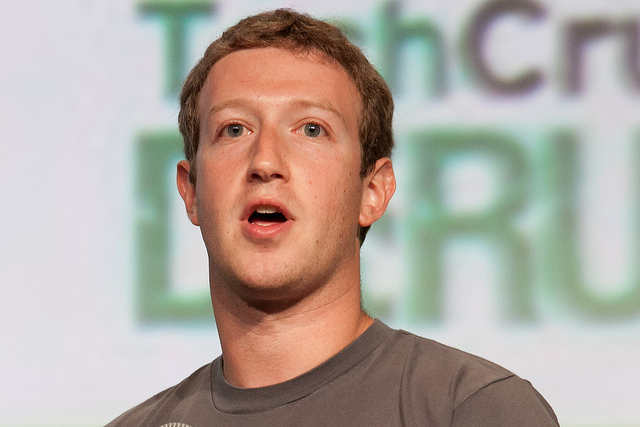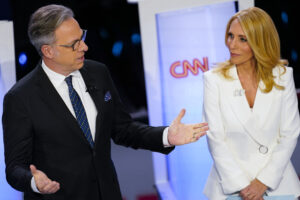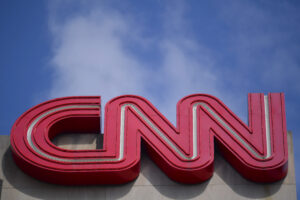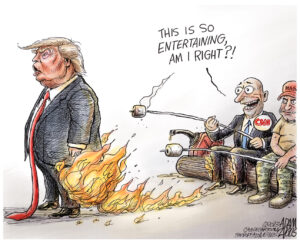Censoring Facebook Censors Us All
The New York Times and other mainstream outlets are calling for Mark Zuckerberg's head. They're only inviting a crackdown on free speech. Facebook CEO Mark Zuckerberg. (JD Lasica / Flickr)
Facebook CEO Mark Zuckerberg. (JD Lasica / Flickr)
A couple of bank robbers phone one another and agree to meet at a local diner. Over ham and eggs, they talk over their next heist. Then they drive to a nearby branch and make off with the loot.
Question: What is the phone company’s legal responsibility in this affair? Is it guilty of aiding and abetting because a couple of bad guys used its facilities to engage in a criminal conspiracy? How about the short-order cook: Is he guilty because he provided them with needed sustenance? Is the manufacturer of the getaway car liable as well?
Most people would say no, on the grounds that if they are guilty, then anyone is guilty who in some way unknowingly contributes to a crime. But The New York Times and other news outlets disagree. It has taken the dubious concept of an unknowing accomplice and used it to mount an aggressive campaign against Facebook and other social media. Their alleged crime: failing to stop foreign powers from using their networks in ways the Times deems harmful to American political health. It’s like attacking Verizon or AT&T for failing to stop people from using their phones to call a drug dealer or send a sexually explicit text to an underage adolescent.
The hue and cry couldn’t be more dangerous, because the clear implication is that if Facebook doesn’t police its network, someone else will do it instead. That someone could be self-appointed guardians of the public trust, such as the Times, or various federal agencies. But the effect will be the same. Free speech will narrow, debate will turn lifeless and dull, and censorship will creep in through the back door. Liberals are outraged because Donald Trump tried to banish a notorious attention-hog like CNN’s Jim Acosta from the White House press pool. But what they’re doing is far worse, because it involves a systematic crackdown on the entire internet.
As a recent Times editorial put it:
[T]he fundamental design of social media sometimes exacerbates the problem. It rewards loyalty to one’s own group, providing a dopamine rush of engagement that fuels platforms like Facebook and YouTube, as well as more obscure sites like Gab or Voat. The algorithms that underpin these networks also promote engaging content, in a feedback loop that, link by link, guides new audiences to toxic ideas.
The solution is what the editorial calls “a coherent strategy” to keep dangerous information out of the hands of ordinary people who can’t handle a Facebook high. Unable to judge for themselves what’s toxic, the Times thinks, Americans need a powerful authority figure to do it for them.
The Times, the leader of the anti-free-speech crusade, employs a logic all its own. Not only does it assume that Facebook must be at fault because someone, somewhere, is using it for nefarious purposes, but it cherry-picks the data to make the situation seem worse than it really is—rather as if not one but every diner in America was filled with baddies plotting murder and mayhem. A mammoth front-page article that ran Nov. 14 thus asserts that unnamed malefactors have used the network “to disrupt elections, broadcast viral propaganda and inspire deadly campaigns of hate around the globe.” When Trump called for a shutdown on Muslim immigration in December 2015, the story adds, it “illustrat[ed] the site’s power to spread racist sentiment” because Facebook users shared the item some 15,000 times.
This certainly sounds ominous. But the Times quoted the same call to arms in a Dec. 8, 2015, news story on its website and in a video. Considering that its website gets some 130 million hits a month, does that illustrate the Times’s power to spread racist sentiment as well?
The article goes on to say that Alex Stamos, Facebook’s in-house security chief, discovered “that Russian hackers appeared to be probing Facebook accounts for people connected to the presidential campaigns” in early 2016. Months later, it adds, the Stamos team “also found Facebook accounts linked to Russian hackers who were messaging journalists to share information from the stolen emails.”
This also sounds ominous, but at the same time curiously vague. After all, what does “linked” mean—that hackers owned such accounts or occasionally logged into them? What is a Russian hacker, anyway—someone who lives in Russia or works for the Russian government or merely has a Russian name? What does it matter if hackers alerted journalists to the content of certain emails? If the information is solid, isn’t that all that counts?
Answers to questions like these are essential if readers are to understand what the Facebook controversy is about—who’s using it, how extensively and to what end. But they are questions the Times systematically avoids. The article says that, on Sept. 6, 2017, Facebook issued a short notice regarding alleged Russian interference. But it complains that the notice “said little about fake accounts or the organic posts created by Russian trolls that had gone viral on Facebook, disclosing only that Russian agents had spent roughly $100,000—a relatively tiny sum—on approximately 3,000 ads.”
“Just one day after the company’s carefully sculpted admission,” the piece continues, “The Times published an investigation of further Russian activity on Facebook, showing how Russian intelligence had used fake accounts to promote emails stolen from the Democratic Party and prominent Washington figures. The combined revelations infuriated Democrats, finally fracturing the political consensus that had protected Facebook and other big tech companies from Beltway interference. Republicans, already concerned that the platform was censoring conservative views, accused Facebook of fueling what they claimed were meritless conspiracy charges against Mr. Trump and Russia. Democrats, long allied with Silicon Valley on issues including immigration and gay rights, now blamed Mr. Trump’s win partly on Facebook’s tolerance for fraud and disinformation.”
Republicans and Democrats can’t resist bashing an easy target? So what else is new?
In fact, the Facebook summary of its in-house investigation was more nuanced than the Times let on. While it identified some 470 “inauthentic accounts” responsible for purchasing $100,000 worth of ads, it found that the purchases had taken place over a two-year period beginning in June 2015, meaning that many had occurred after Nov. 8, 2016, and therefore had no effect on the election. (Indeed, Facebook general counsel Colin Stretch would later testify that only $46,000 was spent prior to Election Day, which means the intervention was even less impressive than the Times indicated.) Facebook also found that “the vast majority … didn’t specifically reference the US presidential election” and instead “appeared to focus on amplifying divisive social and political messages across the ideological spectrum—touching on topics from LGBT matters to race issues to immigration to gun rights.” Even though the Times has repeatedly implied that the accounts are linked to the Kremlin, Facebook added that all it could determine is that they “likely operated out of Russia.”
So whatever goals such Russians had in mind, electing Donald Trump does not appear to have been one of them. Yet the Times tailored the evidence to make it seem that a great conspiracy was underway that Facebook was too negligent, lazy or corrupt to stop. As with “Russiagate” in general, the goal was to “externalize” America’s problems by attributing them to others while letting the U.S. itself off the hook. Why engage in painful self-criticism when it’s so much easier to criticize others instead?
Since that article, the anti-Facebook jihad has continued pretty much nonstop. Four days later, Times media columnist Jim Rutenberg castigated Zuckerberg for “publicly doubting the effects of the disinformation campaign taking place on his platform.” Zuckerman’s crime, it seems, was declaring, shortly after Trump’s election, that it was “pretty crazy” to suggest that fake news had swung the contest in his favor, adding, “Voters make decisions based on their lived experience. There is a profound lack of empathy in asserting that the only reason someone could have voted the way they did is because they saw fake news.” But after years of sound and fury about Russian manipulation and little evidence to back such charges up, such words seem more than sensible, while Rutenberg’s seem feverish and overblown.
Five days after that, op-ed columnist Jennifer Senior sailed into Facebook No. 2 Sheryl Sandberg for “work[ing] to minimize findings that the Russians had taken up residence on Facebook in 2016 in order to sow disinformation in the run-up to the American presidential election.” A day later, Times opinion writer Kara Swisher lamented that because he owns 60 percent of Facebook stock, Zuckerberg “is unkillable, unfireable, and untouchable.” Plainly, Swisher longs to drive a stake through the man’s heart, if only the Times’ ethics code would let her.
Not that the Times is the only one playing this game. The New Yorker also pitched in by finding a former Facebook vice president who said, “The short-term, dopamine-driven feedback loops that we have created are destroying how society works—no civil discourse, no cooperation, misinformation, mistruth.” (This was undoubtedly where the Times got its anti-drug imagery from.) Not to be outdone, The Guardian described Zuckerberg as “an autocrat pretending to be president,” while Washington Post columnist Helaine Olen said that it was no surprise “that the people responsible for running a website that entices people to reveal their personal innards so that the website can, in turn, monetize their heartfelt ruminations and day-to-day minutiae are so ethically challenged. … The odds of Facebook changing much, short of substantive legislation out of Washington, [are] less than zero.”
Facebook-bashing is thus all the rage. But does The New Yorker honestly think that Facebook is destroying society? And what kind of “substantive legislation” does WaPo have in mind? Does it really want the federal government to blacklist information that Americans supposedly can’t handle?
Facebook deserves the same scrutiny as any other megacorporation. But criticizing it is one thing, censoring its users quite another. As Matt Taibbi points out in Rolling Stone, the campaign has already led to the purge of hundreds of Facebook sites, many by all appearances on the up and up. The fact that the network, in its effort to weed out “fake news,” is now teaming up with the Atlantic Council, a hawkish Washington think tank funded by oil companies, arms manufacturers, Ukrainian oligarchs and the United Arab Emirates, shows where all this is heading, i.e., toward a strengthening of the most bellicose elements in Washington and the further marginalization of dissent. When Rhode Island Democrat David Cicilline, who will likely head the House Judiciary Committee’s antitrust panel come January, tweets that “Facebook cannot be trusted to regulate itself,” it doesn’t take a genius to figure out what will happen next.
If jackbooted fascists tried to impose censorship, Americans would take to the streets. But when Democrats do it, they’re disarmed. Is this how free speech dies—from a liberal stab in the back?
Your support is crucial…With an uncertain future and a new administration casting doubt on press freedoms, the danger is clear: The truth is at risk.
Now is the time to give. Your tax-deductible support allows us to dig deeper, delivering fearless investigative reporting and analysis that exposes what’s really happening — without compromise.
Stand with our courageous journalists. Donate today to protect a free press, uphold democracy and unearth untold stories.






You need to be a supporter to comment.
There are currently no responses to this article.
Be the first to respond.